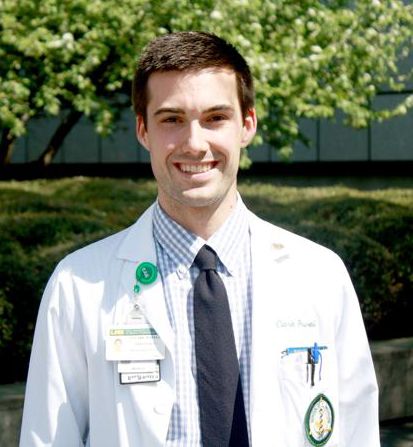 For Clark Powell, it’s important that he becomes a doctor who understands how new and evolving treatments get from the world of research, data, and evidence to the clinical world of implementation.
For Clark Powell, it’s important that he becomes a doctor who understands how new and evolving treatments get from the world of research, data, and evidence to the clinical world of implementation. “Part of that, to me, is being involved in a translational science project, where we use data to learn how to better manage clinical scenarios,” he said.
Through a prestigious grant from the American Society of Nephrology, the third-year UAB medical student will get the chance to take a year away from his medical studies to conduct dedicated research on a new acute kidney injury staging system developed at UAB.
Working at UAB, Powell, 25, will collect one-years’ worth of patient data from UAB and from the University of California San Diego to evaluate the system’s utility in identifying and staging acute kidney injury in hospitalized patients.
“The Delta-Creatinine AKI Staging System is designed to identify people with AKI earlier and give a better picture of its severity,” Powell said. “It can also hopefully guide us in the future on how better to prevent AKI and can tell us in real-time how urgently the patient needs to be treated.”
The new staging system, developed by Henry E. Wang M.D., an associate professor in the Department of Emergency Medicine, and David G. Warnock M.D., a professor in the Division of Nephrology, has been through one round of initial validation at UAB. The grant will provide Powell $500 a week—including a $400 per-week stipend for him and $100 per week for lab expenses—for 52 weeks. He will begin preliminary work in July after finishing his last clinical rotation.
“I’m really enthusiastic about having the opportunity to be funded for a year to conduct this research,” Powell said. “I think receiving the grant has already taken some of the pressure and uncertainty of taking a year away from medical school off of me and is giving me motivation as well as a goal to work toward.”
Powell, a Birmingham native, is in the coordinated M.D./MPH program, having deferred his first year of medical school to complete his master’s coursework. He said that move opened the door to his involvement with this project because he had some training in biostatistics and research methods. He was put in contact with Wang about the project after talking with Todd Peterson, M.D., the clerkship director in his emergency medicine rotation, earlier this year.
Powell said Wang, Warnock and Anupam Agarwal, M.D., interim vice president for Medicine and dean of the School of Medicine and director of the UAB-University of California San Diego O’Brien Core Center for Acute Kidney Injury Research, have provided much-needed support and encouragement in his applying for the grant.
“I’m lucky to have gotten to work with them so far and am looking forward to being mentored by them over the course of the next year,” Powell said. “For me, it’s important to understand the process of identifying a problem, applying available knowledge and data to it, then learning how best to use that information in clinical environments,” Powell said. “I think the best way to do that is to be involved in gathering data and working with it hands-on.”